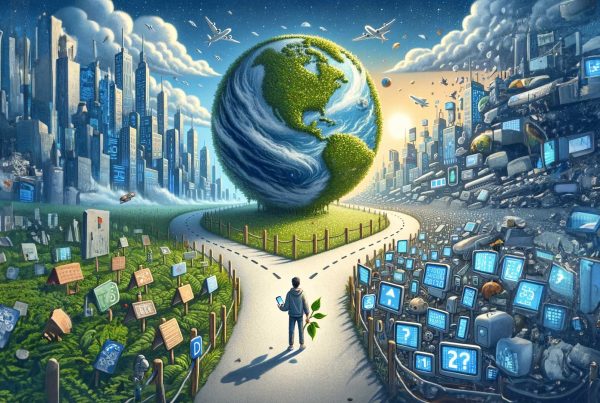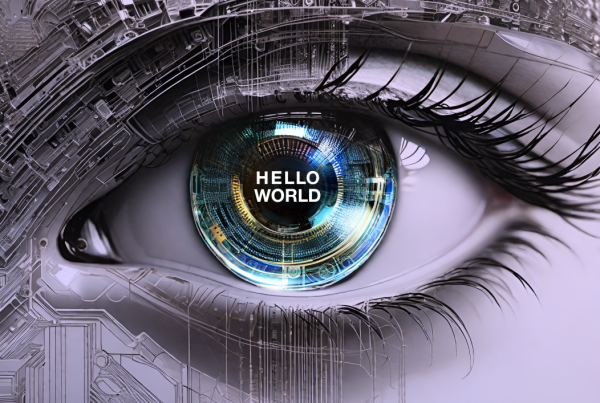Is it possible to strategically direct social consequences??
In this age of technological progress, artificial intelligence (AI) is proving to be an inescapable driving force. This irrepressible technological thrust is having a major impact on the way we think and behave in the workplace. From massive data management to process automation, AI is redefining operations for businesses of all sizes. This revolution brings greater efficiency, more informed decisions, and paves the way for unprecedented innovations.
The applications of AI are vast: improving customer service through virtual assistants, supply chain optimization, predictive analytics for real-time decision-making, and much more. In sectors such as healthcare, AI contributes to more accurate diagnoses and personalized treatments. In marketing, it enables a deeper understanding of consumers, transforming sales strategies.
Putting people at the heart of this technological revolution is essential.
AI, with its ability to process massive amounts of data, must not eclipse natural human intelligence, but rather coexist in synergy with it. The challenge is to strike a balance between AI’s colossal compiling capabilities and the unrivalled abilities of humans to create new ideas, experience their emotions and feel the feelings they give us. Humans know how to empathize, unlike their digital avatars.
So how can natural human intelligence be incorporated into this high-tech boom? We need to develop AI systems that not only process data, but are also capable of learning from human experience and adapting to a variety of social and cultural contexts. This requires a deep and coordinated commitment from a variety of specialists, including AI developers, sociologists, anthropologists, philosophers, ethicists and lawyers. It is essential to ensure that this collaboration is inclusive, incorporating a wide variety of sectors of society. The aim is to ensure a global, human and balanced approach, where each discipline brings its unique expertise to bear on the complex, multi-dimensional issues represented by the development of artificial intelligence.
The future of vocational training is also changing. The introduction of artificial intelligence into learning methods could revolutionize the way we train our professionals. AI makes it possible to design highly personalized training programs, adjusting flexibly to the pace and learning capabilities of each individual. This development highlights the importance of lifelong learning. In this context, the skills required for professions are likely to undergo constant change, in response to the emergence and integration of new future technologies. This opens up a wide range of possibilities in terms of learning methods and pathways, offering a vast array of opportunities for learners from all sectors. But can we give the right direction to this field of possibilities?
One major concern remains: how can we ensure that the benefits of AI accrue to all humanity, not just an elite? The key lies in fair and inclusive policies, guaranteeing equal access to the technology and the training needed to exploit it.
Since the 1950s, technological evolution has often been perceived as a promise of progress, helping to free people from laborious, repetitive tasks and opening the door to greater leisure and personal enrichment. This vision has largely contributed to the acceptance of emerging technology in our daily lives. In the current context, marked by the advent of artificial intelligence, we find ourselves at a critical juncture, where the direction taken will define the future of our society. This challenge raises fundamental questions about the nature of progress and its role in human fulfillment. To fully realize the promise of beneficial technological progress, meticulous thought and organization are required. This requires a redefinition of our educational, labor and social systems, taking into account ethical and moral imperatives. The aim is to ensure that artificial intelligence serves the common good, contributing to development that is not only technologically advanced, but also ethically responsible and sustainable.
AI, by revolutionizing the world of work, confronts us with unprecedented challenges and opportunities. Its growth and integration must be driven by a humanistic vision, ensuring that technology enriches everyone’s lives and does not create a widening gap between the privileged and the rest of society.
The introduction of AI into the world of work represents a major turning point, bringing both unprecedented challenges and opportunities. It is therefore imperative that its development and integration be guided by humanistic and ethical principles. This means paying particular attention to ensuring that this technology makes a positive contribution to everyone’s lives, rather than exacerbating existing inequalities. It is essential to adopt a balanced and inclusive approach, aimed at preventing a widening of the gap between those with privileged access to new technologies and those who are marginalized. In short, it’s about ensuring that AI serves the public interest and fosters a fairer, more just society.
It is only by putting people at the heart of technological evolution that everyone will benefit from the advantages that artificial intelligence claims to offer society.








